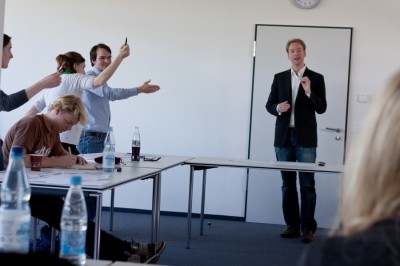Abolish Points of Information? Doug Cochran’s thoughts on how to improve POIs.
At the World Debate Forum in Berlin 2013, debaters from across the world talked about using debating in tournaments, trainings and youth projects. In the opening speech, Doug Cochran presented “Ten suggestions for a better Worlds”. Among these points, he suggested to abloish or reform Points of Information during BP debates. As these thoughts might interest you aswell, Achte Minute asked Doug to write down his thoughts.
Doug Cohran: Two Potential Reforms to Points of Information
At the World Debating Forum, there was a discussion about potential reforms to WUDC debating. I put forward a number of suggestions, including abolition of points of information, which I elaborate upon here.
I should point out- as I did when I gave the talk- this is all just a suggestion. As I’m really too old for serious debating, I should reiterate my belief that debating should be whatever its participants want it to be. This is just one idea of something that I think could make it better.
My difficulties with Points of Information are two-fold:
Firstly, they interrupt proper debating, usually for silly reasons. In the course of offering points of information, debaters spend an enormous amount of time bouncing up and down, often with affected sighs or cries of ‘Sir/Madam!’ designed to demonstrate to all assembled that (shockingly!) they disagree with what is being said. It’s rude, it’s off-putting, and experienced speakers are rarely called to order when they do so. Even when speakers are behaving themselves, points of information distract from proper listening as speakers spend their time planning points of information, discussing them with their partners, and standing to offer them. If judges track when POIs are being offered (as they are meant to do) that can only further serve to distract their attention from the flow of arguments. When accepted, points of information often take the speaker off their train of thought and interrupt the flow of a speech (indeed they often do so deliberately).
Secondly, it is nearly impossible to apply sanctions to speakers who do not accept points of information or who accept too few. The traditional sanction is to ‘penalise the speaker as though they had dealt with a good POI very badly’ (or something to that effect). But no judge actually does this, because the standard is nearly impossible to apply. Points of information that are actually answered badly don’t merely count to the discredit of the speaker answering them, they count to the positive credit of a particular team that has offered them. If no POI has been taken, it becomes impossible to apportion that credit. Moreover, POIs don’t merely harm a case in the abstract, they do damage to particular claims, which are more or less important depending on the how the debate has played out thusfar. I have never heard a judge say in feedback that they would have awarded a place to a particular team, but for their failure to accept a point of information- judges with a reputation protect.
As I see it, the necessity for points of information arises because the BP would not otherwise allow any direct engagement between teams diagonally across from each other.
One suggestion would be to abolish points of information altogether and replace them with reply speeches, in a format similar to Australasians or Worlds Schools. Reply speeches could be roughly three minutes in length and given by either member of the top-half teams. If necessary, time could be deducted from the other speeches in the debate (shortening each to six minutes, for example) in order to save time. Given that speakers would now no longer have to interact with points of information, it seems reasonable to assume that the loss of the minute will not be very much missed and speakers able to deliver something like the same amount of total content.
A more moderate suggestion would simply be to reform the role of points of information in a way that minimises their capacity to distract and maximises the time spent concentrating on content. My suggestion would be to insert a rule to this effect:
Each team has the right to ask each opposing team one- and only one- point of information. When a speaker rises to offer their team’s point of information, they cannot be declined. Having been accepted, the team that has offered the point may not offer the same team any further points during that debate.
As well as emphasising listening and minimising interruption, this reform would give each team a guaranteed opportunity to offer a point with no risk of being ‘shut out’. Rather than trying to crowd out the other team on the bench by asking whatever comes into their minds, speakers would have an incentive to use their POI carefully and only rise when their question is particularly well-thought-out.
Doug Cochran / pst









I would strongly disagree. POIs are one thing that makes BP attractive, interactive and different from styles used for high school students. I have to agree that POIs are distractive and disruptive – but that is good! They bring a whole new level of skills to the debate compared to high-school styles (KP, WS…) and support the educational side of the debate. In fact many high-school debaters here in Czech Rep. look forward to BP’s interactivity and a freedom of a sort, because during their high-school they often mentally overgrow the boundaries of KP. Therefore we don’t want BP to formally became more similar to KP. By abolishing POIs, BP would lost most of its atractvity and adrenaline action, would lost a link to the british parliamentary tradition and would become dry and boring. Even for the judge POIs usualy are a bright side in otherwise relatively boring judging. And finally there’s always the argumentum ad antiquitatem 🙂
I strongly disagree, too. The format of BP already encourages the so-called ‘matter grab’, which makes every speaker try and fit in as much content at the cost of argumentative tactics like framing, positioning, selecting the best possible material, careful refutation, actually engaging the other side, and more. This makes BP feel more like a group of eight sophomores haphazardly trying to give a lecture in political economy or philosophy, in stead of a real-life, actual ‘debate’. Taking away the POIs only strengthens this tendency.
Also: note how Doug’s arguments mostly focus on the cultural practice of ‘how POIs are done in BP these days’: one, he personally finds them rude and off-putting. Even if I would agree with him on this, we could require debaters to offer them in a civilized fashion. He also notes how judges never use the offering or refusing of POIs as a criterion – that just shows that there are many judges out there who haven’t developed a complete picture of what debating could be.
As to why they should be necessary: I don’t think ‘necessity’ should be a criterion in a game like this. To make a comparison with football: why is a rule like ‘offside’ necessary? It isn’t – it’s just one of these rules that give the game a more interesting dynamic. Doug himself admits this in his intro: the correct criterion should be what we want the game to be.
And here’s what I want the game to be: I want debating to be a full and complete test of verbal agility, a battle of wits, of thinking-on-your-feet and being able to get a handle on a complex issue in seconds. If that’s what I want it to be, then surely POIs have an important role to play in them.
Judges never penalize not taking POI? Well, make them do it. It’s easy to write a rule that penalizes anybody that doesn’t take a POI with -1 or -2 speaker points.
POIs distracting? Not really, you just signal them to sit down with a hand gesture. Your second proposal (mandatory taking 1 POI when offered) is more distracting, because it will be strategically offered in the middle of an argument.
Without POIs, there is no need for Opening Gov to follow the debate after the third speech. In other words: If Debating is about interacting, abolishing POIs is not very helpful…
Being a debater who started debating already in school I would like to add that in World Schools Style (which is my top favourite debate style) we have POIs as well. Yes, a reply speech is great and could well be introduced, but no, I would not want to abolish POIs. For my part they make me being much more concentrated during the debate as I carefully have to listen what the other one says in order to ask questions whenever I did not understand something or in order to point out that there are some controversies in the other team’s case. Plus, they enhance the ability to listen, think and write at the same time, which in my opinion is always useful.
I would say that the POIs are crucial for the interaction between government and opposition and actually make debating such a tough and interesting sport! And yes, the speaker who is offered a point of information is interrupted in his/her speech – but reacting properly to a POI and at the same time not forget what you said and want to say is in my opinion an ability trained by and required for debating. I mean, in the end, this is what usually happens in everyday discussions with other people, right? – you’re being interrupted but still want to get your point through…
However the second proposal of limiting the numbers of POI one party can address to every opponent party, combined with the obligation to accept the POI for the speaker, is a proposal worth to consider. It will lead to a stronger concentration on putting POIs and will so emphasize their strategical role in the debate.
I only differ from the article in the number of POIS the speaker should be forced to accept. I think one POI per party to each speaker of the opposite side would be a better number than just “a half”. Only one POI per team-team-interaction will tend to lead to “back-loading” of arguments in a team (hoping these new points cannot be criticised because the opponent’s reservoir of POIs is empty), so that the first speaker of each team will get no POIs at all. This back-loading will imho take speed out of debates that makes them so exciting for me.